- Joined
- Aug 8, 2008
- Messages
- 6,070
- Points
- 83
https://www.rt.com/business/424233-oil-story-template-oilprice/
Death by a thousand cuts: China’s yuan-priced crude benchmark chips away at petrodollar
Published time: 16 Apr, 2018 08:02 Edited time: 16 Apr, 2018 08:34
Get short URL

Uma Thurman as Black Mamba aka The Bride in ‘Kill Bill: Volume 1.’ © Global Look Press
The start of the new contract trading was successful, attracting interest from institutional and retail investors, and major commodity trading houses Glencore and Trafigura.
Yet, it’s too soon to call the less-than-a-month-old contract a total success, because it still faces a long road toward building reputation and history, analysts say. They have also identified the single biggest risk factor for western investors—the extent to which China could meddle with government regulation in the yuan crude futures, as Beijing is known for little tolerance toward wild price swings in its markets and has a history of intervening.
Read more
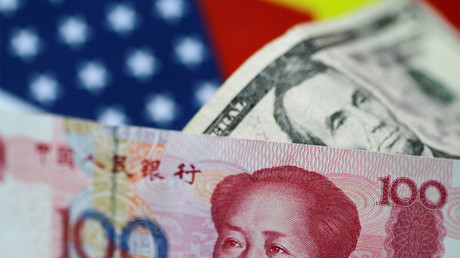 Petro-yuan to launch renminbi as global currency & kneecap petro-dollar
Petro-yuan to launch renminbi as global currency & kneecap petro-dollar
This is also the conclusion of China’s biggest crude oil supplier, OPEC. In its April Monthly Oil Market Report, the cartel—which accounts for close to 60 percent of China’s crude oil imports—said that “the extent to which the INE contract is independent from government interference is currently the main risk factor facing western investors, which is in addition to a currency risk, given that the INE is settled in yuan.”
According to Reuters’ John Kemp, possible Chinese intervention on the yuan crude future market could be one of the three elements that could doom the new contract. Citing the paper ‘Why Some Futures Contracts Succeed and Others Fail’, Kemp argues that the third key element to a successful futures contract—public policy should not be too adverse to futures trading—could be the stumbling block to the Chinese crude futures, while the new contract could easily meet the other two criteria for success. These are 1) a commercial need for hedging and 2) a pool of speculators must be attracted to a market.
OPEC, especially its Middle Eastern producers, will be closely watching the futures contract because once established, the Chinese reference crude price could act as a regional benchmark for negotiations of spot or term crude oil prices. The contract is made up of seven medium-sour crudes prevalent in the Chinese market—six freely traded Middle East grades (Basrah Light, Dubai, Masila, Oman, Qatar Marine, and Upper Zakum), and China’s Shengli crude.
“At this level of imports from OPEC, Middle Eastern producing nations will be watching closely as they could, in time, face pressure from their Chinese buyers to adopt this benchmark for pricing their physical crude contracts,” the cartel said in its monthly report.
Read more
 No respect for elders: China's new oil benchmark crushing old-timer Brent
No respect for elders: China's new oil benchmark crushing old-timer Brent
The fact that OPEC dedicated a special article on the Chinese yuan crude futures in its closely watched report shows that the cartel is taking seriously the possibility that at some point in the future, its Middle Eastern members may have to price the oil they sell to China versus a Chinese crude benchmark.
While the official goal of the new futures contract is to establish a regional benchmark for more useful pricing of the crude grades prevalent on the Chinese market, analysts see the yuan oil futures as a step toward China seeking wider acceptance of its currency in global trade, including the oil trade, and establishing a petro-yuan that could challenge, in the future, the dominance of the petrodollar.
China is now the biggest crude oil importer in the world, and the pace of its oil demand growth is capable of influencing the oil market and the trade in the two most traded crude futures in the world, Brent and WTI. So it makes sense for the top crude importer to want to use oil as a means to promote its own currency on international markets.
According to Dr Mohamed Ramady, an energy economist and geopolitical expert on the GCC, the launch of the yuan crude futures contract has two key rationales—politics and pragmatism. On the practical side, such a contract would better reflect the crude grades on the Chinese market that often differ from the grades underpinning the Brent and WTI benchmarks.
On the political front, “Denominating oil contracts in yuan would promote the use of China’s currency in global trade, one of the country’s key long-term goals as an alternative to the dollar – making this even more appealing to sanctions-threatened countries relying on the dollar,” Ramady wrote in The National.
Read more
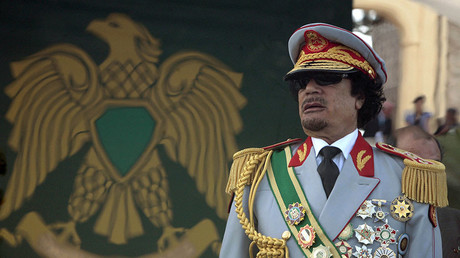 China can succeed with petro-yuan where Gaddafi failed – killing the US dollar in oil trade
China can succeed with petro-yuan where Gaddafi failed – killing the US dollar in oil trade
The yuan is still used in less than 3 percent of global trade, but the yuan crude futures contract and China’s push to assert its currency internationally “could perceptibly change in the near future and create the conditions for a respectable challenge to the US dollar,” Ramady said.
Hayden Briscoe, Head of Fixed Income, Asia Pacific, at UBS Asset Management, said in a report just before the Chinese futures launched that “We believe that in the long term this will change how oil is traded globally, create a petro-yuan currency flow, increase the role of the RMB [renminbi - Ed.]as a global trading currency, and compel investors to up their allocations to Chinese financial assets.”
In the longer term, yuan oil trading could shift the structure of the global oil market, but two things need to happen first, Briscoe said. One is that China needs to remove, or substantially reduce, capital controls. The other is that China’s oil suppliers such as Saudi Arabia, Russia, and Iran to agree to accept yuan for their oil exports to China. “This is also taking shape because Russia already accepts RMB for oil exports, as does Iran, and we expect Saudi Arabia to soon begin invoicing China in RMB,” Briscoe wrote.
The yuan crude futures launch is as much practicality as it is politics, but many analysts and OPEC itself see Chinas’ domestic capital market policies as the biggest threat to the contract’s success.
This article was originally published on Oilprice.com
https://www.rt.com/usa/424227-trump-withdraw-syria-quick/
Trump wants to pull troops from Syria 'as quickly as possible,' but it won't be very quick
Published time: 16 Apr, 2018 01:28 Edited time: 16 Apr, 2018 07:53
Get short URL
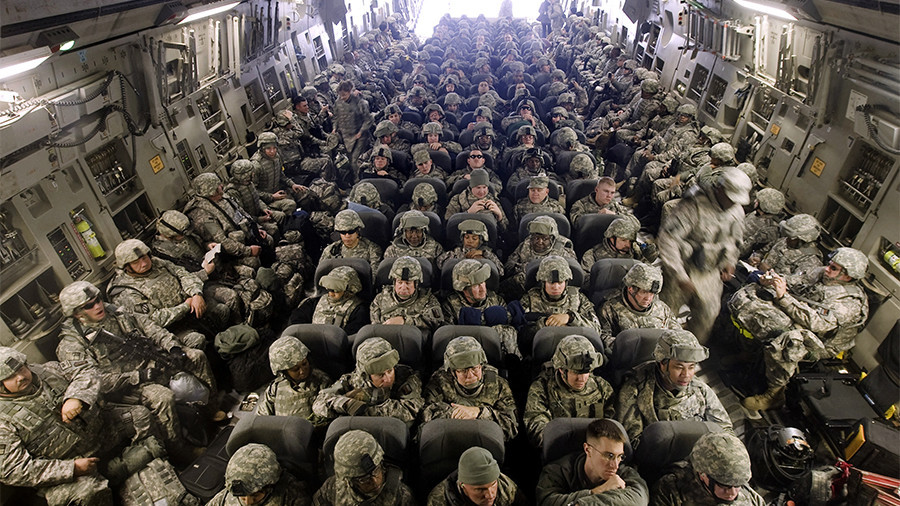
FILE PHOTO © Shamil Zhumatov / Reuters
"The US mission has not changed – the president has been clear that he wants US forces to come home as quickly as possible," White House spokeswoman Sarah Huckabee Sanders said in a statement cited by Reuters. The US has some 2,000 troops and a number of military contractors acting in Syria. Before they go home, though, their mission has to be fulfilled.
Read more
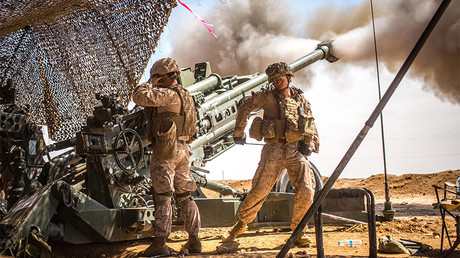 US won’t pull out troops from Syria until goals accomplished – UN envoy Haley
US won’t pull out troops from Syria until goals accomplished – UN envoy Haley
"We are determined to completely crush ISIS and create the conditions that will prevent its return. In addition, we expect our regional allies and partners to take greater responsibility both militarily and financially for securing the region," Sanders said.
The goals outlined by Sanders were earlier mentioned by the US envoy to the UN, Nikki Haley, in a Fox News interview. Haley's list was somewhat broader, though, adding monitoring Iran's activity and ensuring American interests are safe from Syrian President Bashar Assad's purported chemical weapons. The somewhat vague objectives, combined with Washington's refusal to hold any direct talks with Damascus and numerous demands for Assad to step down or be toppled, could effectively extend "as quickly as possible" to a nearly indefinite stretch.
Indeed, French President Emmanuel Macron, one of Trump's allies in the recent joint strikes on Syria, said he had convinced Trump to keep the troops in place for the unspecific "long term."
"Ten days ago, President Trump was saying 'the United States should withdraw from Syria'. We convinced him it was necessary to stay," Macron said.
In late March, Trump said the US would be "coming out of Syria very soon" and letting "other people take care of it now," which went against previously-outlined plans by the Pentagon and the State Department to keep troops in Syria to "support our partners," "prevent the return of terrorist groups" and transition to a "post-Assad leadership."
Read more
 We're coming out of Syria very soon, let others take care of it - Trump
We're coming out of Syria very soon, let others take care of it - Trump
Soon after that, Syrian anti-government activists, including the White Helmets, claimed Assad launched a chemical attack that killed and injured dozens of civilians in Douma, a suburb of Damascus that he was close to decisively re-taking from militants. Russian forces, who are on the ground to assist Damascus in fighting terrorists and de-escalating the conflict, said they had not found any evidence or victims of the alleged attack, and accused the White Helmets of faking it. Presently, Trump boasted that "nice and 'smart'" American missiles would soon fly to Syria.
After a week of UN Security Council meetings and failed resolutions, and before a fact-finding mission by the Organization for the Prohibition of Chemical Weapons (OPCW) could arrive at the site of the alleged attack, Trump, together with Macron and UK Prime Minister Theresa May, launched about a hundred missiles into Syria. Their stated goal was to cripple Assad's purported chemical weapons facilities and stockpiles, but one of the targets they hit was reportedly a civilian facility that specialized in medicine.
Now, Haley says at the UN Security Council that America remains "locked and loaded" for more strikes should new "chemical attacks" come, and uses an if-clause when talking to Fox about the prospects of withdrawal from Syria. And while Trump's people say he wants a withdrawal "as quickly as possible," it's highly likely that it will not be very quick at all.

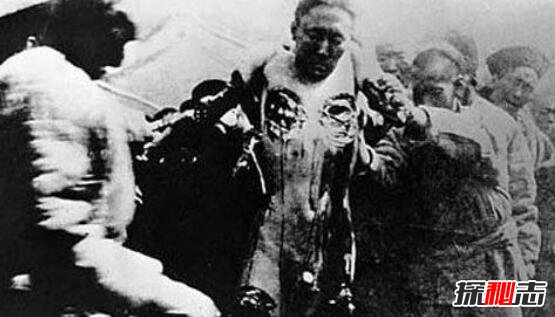

Death by a thousand cuts: China’s yuan-priced crude benchmark chips away at petrodollar
Published time: 16 Apr, 2018 08:02 Edited time: 16 Apr, 2018 08:34
Get short URL

Uma Thurman as Black Mamba aka The Bride in ‘Kill Bill: Volume 1.’ © Global Look Press
- 150
The start of the new contract trading was successful, attracting interest from institutional and retail investors, and major commodity trading houses Glencore and Trafigura.
Yet, it’s too soon to call the less-than-a-month-old contract a total success, because it still faces a long road toward building reputation and history, analysts say. They have also identified the single biggest risk factor for western investors—the extent to which China could meddle with government regulation in the yuan crude futures, as Beijing is known for little tolerance toward wild price swings in its markets and has a history of intervening.
Read more
 Petro-yuan to launch renminbi as global currency & kneecap petro-dollar
Petro-yuan to launch renminbi as global currency & kneecap petro-dollar This is also the conclusion of China’s biggest crude oil supplier, OPEC. In its April Monthly Oil Market Report, the cartel—which accounts for close to 60 percent of China’s crude oil imports—said that “the extent to which the INE contract is independent from government interference is currently the main risk factor facing western investors, which is in addition to a currency risk, given that the INE is settled in yuan.”
According to Reuters’ John Kemp, possible Chinese intervention on the yuan crude future market could be one of the three elements that could doom the new contract. Citing the paper ‘Why Some Futures Contracts Succeed and Others Fail’, Kemp argues that the third key element to a successful futures contract—public policy should not be too adverse to futures trading—could be the stumbling block to the Chinese crude futures, while the new contract could easily meet the other two criteria for success. These are 1) a commercial need for hedging and 2) a pool of speculators must be attracted to a market.
OPEC, especially its Middle Eastern producers, will be closely watching the futures contract because once established, the Chinese reference crude price could act as a regional benchmark for negotiations of spot or term crude oil prices. The contract is made up of seven medium-sour crudes prevalent in the Chinese market—six freely traded Middle East grades (Basrah Light, Dubai, Masila, Oman, Qatar Marine, and Upper Zakum), and China’s Shengli crude.
“At this level of imports from OPEC, Middle Eastern producing nations will be watching closely as they could, in time, face pressure from their Chinese buyers to adopt this benchmark for pricing their physical crude contracts,” the cartel said in its monthly report.
Read more
 No respect for elders: China's new oil benchmark crushing old-timer Brent
No respect for elders: China's new oil benchmark crushing old-timer Brent The fact that OPEC dedicated a special article on the Chinese yuan crude futures in its closely watched report shows that the cartel is taking seriously the possibility that at some point in the future, its Middle Eastern members may have to price the oil they sell to China versus a Chinese crude benchmark.
While the official goal of the new futures contract is to establish a regional benchmark for more useful pricing of the crude grades prevalent on the Chinese market, analysts see the yuan oil futures as a step toward China seeking wider acceptance of its currency in global trade, including the oil trade, and establishing a petro-yuan that could challenge, in the future, the dominance of the petrodollar.
China is now the biggest crude oil importer in the world, and the pace of its oil demand growth is capable of influencing the oil market and the trade in the two most traded crude futures in the world, Brent and WTI. So it makes sense for the top crude importer to want to use oil as a means to promote its own currency on international markets.
According to Dr Mohamed Ramady, an energy economist and geopolitical expert on the GCC, the launch of the yuan crude futures contract has two key rationales—politics and pragmatism. On the practical side, such a contract would better reflect the crude grades on the Chinese market that often differ from the grades underpinning the Brent and WTI benchmarks.
On the political front, “Denominating oil contracts in yuan would promote the use of China’s currency in global trade, one of the country’s key long-term goals as an alternative to the dollar – making this even more appealing to sanctions-threatened countries relying on the dollar,” Ramady wrote in The National.
Read more
 China can succeed with petro-yuan where Gaddafi failed – killing the US dollar in oil trade
China can succeed with petro-yuan where Gaddafi failed – killing the US dollar in oil trade The yuan is still used in less than 3 percent of global trade, but the yuan crude futures contract and China’s push to assert its currency internationally “could perceptibly change in the near future and create the conditions for a respectable challenge to the US dollar,” Ramady said.
Hayden Briscoe, Head of Fixed Income, Asia Pacific, at UBS Asset Management, said in a report just before the Chinese futures launched that “We believe that in the long term this will change how oil is traded globally, create a petro-yuan currency flow, increase the role of the RMB [renminbi - Ed.]as a global trading currency, and compel investors to up their allocations to Chinese financial assets.”
In the longer term, yuan oil trading could shift the structure of the global oil market, but two things need to happen first, Briscoe said. One is that China needs to remove, or substantially reduce, capital controls. The other is that China’s oil suppliers such as Saudi Arabia, Russia, and Iran to agree to accept yuan for their oil exports to China. “This is also taking shape because Russia already accepts RMB for oil exports, as does Iran, and we expect Saudi Arabia to soon begin invoicing China in RMB,” Briscoe wrote.
The yuan crude futures launch is as much practicality as it is politics, but many analysts and OPEC itself see Chinas’ domestic capital market policies as the biggest threat to the contract’s success.
This article was originally published on Oilprice.com
https://www.rt.com/usa/424227-trump-withdraw-syria-quick/
Trump wants to pull troops from Syria 'as quickly as possible,' but it won't be very quick
Published time: 16 Apr, 2018 01:28 Edited time: 16 Apr, 2018 07:53
Get short URL

FILE PHOTO © Shamil Zhumatov / Reuters
- 821
"The US mission has not changed – the president has been clear that he wants US forces to come home as quickly as possible," White House spokeswoman Sarah Huckabee Sanders said in a statement cited by Reuters. The US has some 2,000 troops and a number of military contractors acting in Syria. Before they go home, though, their mission has to be fulfilled.
Read more
 US won’t pull out troops from Syria until goals accomplished – UN envoy Haley
US won’t pull out troops from Syria until goals accomplished – UN envoy Haley "We are determined to completely crush ISIS and create the conditions that will prevent its return. In addition, we expect our regional allies and partners to take greater responsibility both militarily and financially for securing the region," Sanders said.
The goals outlined by Sanders were earlier mentioned by the US envoy to the UN, Nikki Haley, in a Fox News interview. Haley's list was somewhat broader, though, adding monitoring Iran's activity and ensuring American interests are safe from Syrian President Bashar Assad's purported chemical weapons. The somewhat vague objectives, combined with Washington's refusal to hold any direct talks with Damascus and numerous demands for Assad to step down or be toppled, could effectively extend "as quickly as possible" to a nearly indefinite stretch.
Indeed, French President Emmanuel Macron, one of Trump's allies in the recent joint strikes on Syria, said he had convinced Trump to keep the troops in place for the unspecific "long term."
"Ten days ago, President Trump was saying 'the United States should withdraw from Syria'. We convinced him it was necessary to stay," Macron said.
In late March, Trump said the US would be "coming out of Syria very soon" and letting "other people take care of it now," which went against previously-outlined plans by the Pentagon and the State Department to keep troops in Syria to "support our partners," "prevent the return of terrorist groups" and transition to a "post-Assad leadership."
Read more
 We're coming out of Syria very soon, let others take care of it - Trump
We're coming out of Syria very soon, let others take care of it - Trump Soon after that, Syrian anti-government activists, including the White Helmets, claimed Assad launched a chemical attack that killed and injured dozens of civilians in Douma, a suburb of Damascus that he was close to decisively re-taking from militants. Russian forces, who are on the ground to assist Damascus in fighting terrorists and de-escalating the conflict, said they had not found any evidence or victims of the alleged attack, and accused the White Helmets of faking it. Presently, Trump boasted that "nice and 'smart'" American missiles would soon fly to Syria.
After a week of UN Security Council meetings and failed resolutions, and before a fact-finding mission by the Organization for the Prohibition of Chemical Weapons (OPCW) could arrive at the site of the alleged attack, Trump, together with Macron and UK Prime Minister Theresa May, launched about a hundred missiles into Syria. Their stated goal was to cripple Assad's purported chemical weapons facilities and stockpiles, but one of the targets they hit was reportedly a civilian facility that specialized in medicine.
Now, Haley says at the UN Security Council that America remains "locked and loaded" for more strikes should new "chemical attacks" come, and uses an if-clause when talking to Fox about the prospects of withdrawal from Syria. And while Trump's people say he wants a withdrawal "as quickly as possible," it's highly likely that it will not be very quick at all.
- 821



